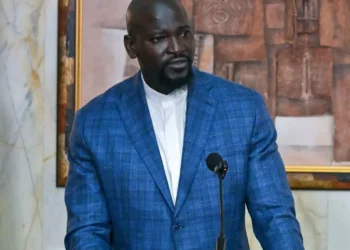The global event industry has faced significant upheaval in recent years, marked by pandemic shutdowns, shifts to hybrid formats, rising costs, and a talent shortage.
It’s easy to point to shrinking budgets or reduced sponsorship as the primary culprits. But money is only one input; how that money is translated into a successful event depends on people and processes.
Repeated problems — late deliverables, inconsistent attendee experiences, cost overruns, last-minute vendor changes, and safety lapses — frequently trace back not to the size of the wallet but to how teams coordinate, plan, and execute under pressure. Fixing teamwork is the leverage point that turns budgets into results.
While many blame weak corporate sponsorship for stunting the growth of event companies in the country, EMY Africa Chief Executive Officer (CEO), Kojo Soboh, argues the real culprits are fragmented collaboration and shaky professionalism.
Yes, funding is a challenge, but Mr Soboh insists the industry’s real hurdles are poor teamwork among players and shoddy professional standards. His solution? Stronger partnerships and a commitment to excellence are needed to revive Ghana’s event sector.
In a recent interview, Soboh emphasised there was a need to confront the deeper issues crippling the sector and not put all the blame on a lack of corporate funding.
“See, we are always quick to finger insufficient funding, but the challenges of event organisers are bigger than that. There is poor collaboration among players, making it difficult for organisers to stage successful events. With most successful events around the world, you will find about three or four event organisers working together on the projects. An example is the Africa Magic Viewers’ Choice Awards (AMVCA), where we have Ghana’s Nabil Alhassan of Event Factory go to Nigeria to support with organising the event.
“Why can’t we do the same in Ghana? Two or three event organisers can come together to execute a good show, but unfortunately, that partnership is nonexistent, and event companies are forced to singlehandedly bear all the cost and stress every time. Many industry players are too competitive. Everyone wants to be the king of their own small space. But imagine if two or three top event organisers pooled resources together to hold an event. It would change the game.”
Kojo Soboh
He believes a united front would not only strengthen bargaining power with sponsors but also improve the quality of productions and even attract international attention. “If two or three event organisers joined forces, costs would drop, quality would rise, and sponsors would take us seriously,” he added.

When departments (creative, logistics, sponsorship, AV, marketing) operate in silos, duplicate work and last-minute change orders often become the norm. For example, late technical requests discovered a week before load-in force expedited shipping or overtime labor — expensive fixes born of misalignment, not scarcity.
Without a RACI-style clarity (who’s Responsible, Accountable, Consulted, Informed), tasks fall between cracks or are redundantly assigned. This breeds rework, missed deadlines, and emergency spending.
Mr Soboh also slammed the lack of professionalism plaguing the industry.
“Let’s face it. Some event organisers lack proper training and expertise, leading to financial losses and poor event execution. It is not enough to have an idea; there is a need to plan and the finances to back it.”
Kojo Soboh
Looking at community festivals, grassroots conferences, and volunteer-run charity events, many succeed on shoestring budgets through strong team culture, clear role distribution, and relentless coordination.
Conversely, large-budget events with poor internal coordination often suffer avoidable overruns. The difference is not funds but the effectiveness of teamwork and planning.
Counterargument: Funding Does Matter

Extreme underfunding indeed constrains what’s possible; no amount of teamwork produces a large-scale immersive production with a nominal budget. Some organizations genuinely need more capital to meet their ambitions.
However, marginal increases in budget do not guarantee proportionate improvements in outcomes if teams remain disjointed. In many cases, the smarter allocation of existing funds — toward training, better planning time, concise communication tools, and leadership — produces higher ROI than simply increasing the event budget.
Mr Soboh expressed concern over the lack of regulatory structures, noting that the absence of entry barriers allowed individuals with little or no expertise to organise substandard events.
“Anyone can wake up and call themselves an event organiser. No training, no structure—just poor execution that scares away sponsors and disappoints patrons. This affects the credibility of the entire sector.”
Kojo Soboh
He encouraged aspiring event managers to pursue formal training and mentorship from experienced professionals to weed out ‘fly-by-night operators’.
Mr Soboh urged corporate Ghana to hire savvy marketers who understood brand partnerships and also called on the government and tourism agencies to back successful initiatives like EMY Africa, which promotes Ghana globally.
“Our expo and awards events attract people from across the continent and beyond. This is tourism. The government should support those of us already doing the work. With their backing, we can go further. This year, EMY Africa Awards marks its 10th anniversary, which comes off in November in Accra. It will be preceded by a series of international activations in London and New York.”
Kojo Soboh
The event industry’s woes are complex and multifaceted, but focusing primarily on funding as the solution misdiagnoses the problem.
Teams that communicate, plan, rehearse, and own outcomes consistently deliver better events — often for less money — while poor teamwork converts even generous budgets into stress, overruns, and lackluster experiences.
By investing in people, processes, and leadership rather than just dollars, event organizations unlock greater efficiency, resilience, and creative success. Fix the team first; the rest will follow.
READ ALSO: IMANI Warns Against Government Vetting Of Prophecies


















